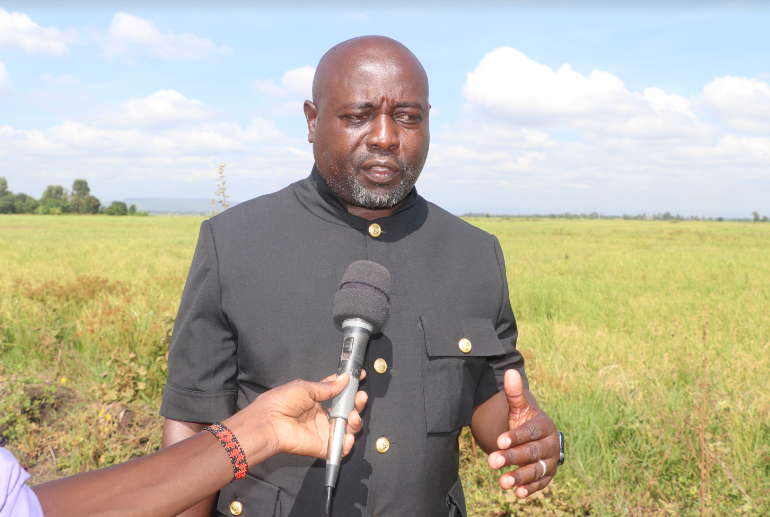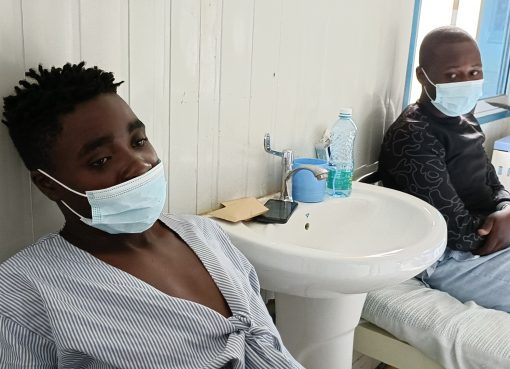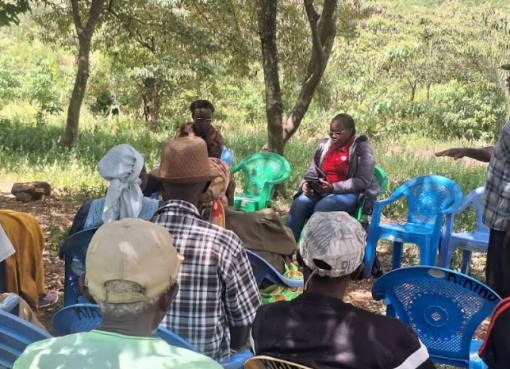Mwea Rice Farmers have recorded increased yields since the completion of Thiba Dam over a year ago.
The scheme is currently producing an annual estimate of 114,000 metric tonnes for the last 3-years.
Mwea Irrigation Settlement Scheme (MIS) is located in Kirinyaga County and falls within two sub-counties, Mwea East and Mwea West sub-counties.
The development of the scheme started in 1954 from the Tebere section with about 65 acres of irrigation farming and has since grown to the current gazetted area of 30,050 acres.
The Scheme Manager, Innocent Ariemba, said the expansion of the scheme is due to support from the national government and development partners.
The Japanese International Corporation Agency (JICA) is a major partner that has constructed the Nyamidi Water Intake, the Mwea Irrigation Agricultural Development (MIAD) research centre, and the Thiba Dam.

The completion of Thiba Dam, which has ensured a steady supply of water, has almost doubled production to about 220,000 metric tonnes.
The dam, which is 40 metres deep and 1 kilometre long and helps stabilise water supplies in the Mwea Irrigation Scheme, has allowed farmers to double rice crop production.
However, in the first year of completion, the country experienced a severe drought, and the dam did not collect enough water to its full capacity.
After long rains, the dam was filled to the brim, releasing water into the Thiba River via spillway.
This year, all farmers will do double cropping, relying on water storage in the dam in case of low rains.
The scheme accounts for 80 per cent of rice production in the country. There have been two rice-growing seasons, but since the completion of the dam, there have been three seasons, whereby the main season starts in July and ends in December. The second starts in October and ends in February, while the third starts in February and ends in July.
The additional expansion of irrigated area is now at 5000 acres, relying on improvised water canals and waterways. Upon full completion of all modern canals, the new area will be 10,000 acres. The scheme has a total length of 10,000km of canals and 500km of access roads, which, according to Ariemba, will require much attention due to double cropping.
He added that there have been plans to upgrade all access roads in all weather.
“The total expansion will be 10,000 acres once the new canals are completed; as of now, using improvised waterways, we have added almost 5,000 acres,” Ariemba said.
The scheme manager says different varieties grow differently and require different agronomy practices.
Farmers are not restricted to certain varieties but are coordinated based on research and water patterns.
The main 3 varieties are Basmati, which takes 120 days to mature, Kwamboka, 115 and Hybrid 130.
Basmati Premium, commonly called Pishori, is common in markets, but farmers are encouraged to adopt high-yielding varieties.
Ariemba highlighted some of the benefits and achievements of the scheme to locals and the nation.
With 17,000 farmers/households registered in the scheme, the average population directly benefiting from it is over 80,000 individuals, given that the majority of households are made up of five people.
“We have over 17,000 registered farmers in the entire scheme, and with every farmer having an average of 5 people, the scheme is serving over 80000 individuals,” he said.
The business at Ngurubani/Mwea town has expanded from industrialization by private millers to accommodate trading activities.
The people employed to work in the farms and millers and through the value chain of processing white rice, paddy, hay, and recycling rice husk have been a source of income.
The scheme also provides opportunities for the private sector, who may want to invest in other businesses to serve the Mwea people.
Ariemba said the total value chain is over Sh9 billion, making it one of the largest economies in Kenya. The national Mwea scheme produces 80% of local rice, which is key to national food security.
The major challenge to the scheme is climate change, extreme droughts, or heavy rains, which were minimised by the dam.
A shortage of water will also be a challenge in the future, according to the manager, because of the huge potential for expansion in the area.
Pests and diseases are another nightmare for the farmers, especially Quelea birds and snails. The migratory bird’s pattern is dynamic, making it difficult to control.
Marketing has also been dynamic, but the Kenya National Trading Corporation has agreed to purchase the rice directly from farmers.
Agriculture is a devolved function; hence, extension officers are deployed by the county governments, but Ariemba decried the shortage of trained officers.
The County Senator, Kamau Murango, who chairs the Senate Committee on Agriculture, Livestock, and Fisheries, said the Thiba Dam is a game changer in rice production in Mwea.
Farmers in the scheme have now started doing double cropping, which will be done annually, as the dam provides continuous, sufficient water.
The senator said to enhance water retention capacity, dam lining should be done to reduce water loss through seepage, thus ensuring maximum water reach for farmers.
He acknowledges the impact of subsidised fertilisers, calling upon Kenya National Trading Corporation (KNTC) to always fast-track the procurement of fertilisers to be available on time for both planting and top dressing.
The chair noted that with the entire value chain being done in Mwea, the economy of Kirinyaga will grow, especially in the Mwea/Ngurubani neighborhood. The farm tilling crew, harvest transporters, and millers will all be leaving profits in the area.
However, Murango said the poor state of access roads and pests are challenges that should be acted upon immediately.
The levy collected from farmers for the renovation of infrastructure annually is estimated at Sh 80 million, against the required 2.9 billion to complete all roads. With El -Nino witnessed in the recent past across the country, the access roads were rendered impassable, making the cost of transport almost triple.
The Kirinyaga County senator said, as a leader from the area and a rice farmer, he has communicated to the Principal Secretary (PS) in charge of Irrigation, Elphantus Kimotho, to assist in fundraising for the improvement of roads in irrigated areas.
Poor roads are a major contributor to the high cost of rice production. “The management is collecting a levy for road management of almost 80 million per year. The entire network needs around 2.9 billion. We need assistance from other stakeholders, and I have requested PS Kimotho for the same,” Murango said.
On pests and diseases, the senator said the Biograde meant to control Apple snails failed and research should be done faster to get rid of dangerous pests posing a threat to rice production from the nursery level.
He added that the ministry and pest control board should provide a lasting solution.
The importation of cheap rice has always been the cause of the poor market for local rice. The imports that always coincide with the harvesting season have made the senator propose a bill for the creation of a board that will ensure that the local rice is given priority by the government.
Despite the fact that locally produced rice is enough to meet the demands of Kenyans, the senator insists that there is a need to ensure a ready market for Kenyan produce.
He added that the minimum guaranteed return of Ksh. 85 per kg is not such low, but with the increasing cost of production, he called on the members of the national assembly to propose another figure between Sh90-100.
On their part, the farmers said the water security due to Thiba will be fully felt this season as farmers have already prepared seedlings to transplant for the second season. The double cropping will double production, thus enhancing food security.
Ngari Muthangato, the farmers’ leader, said going forward, the water problem has been halfway solved, but upon completion of canals, this will be a thing of the past in Mwea.
He challenged the farmers to get certified rice seeds from KARLO for maximum production due to the many varieties being supplied.
Muthangato called on the government to renovate all canals to ease the flow of water in the entire scheme.
By Mutai Kipngetich and David Wandeto





